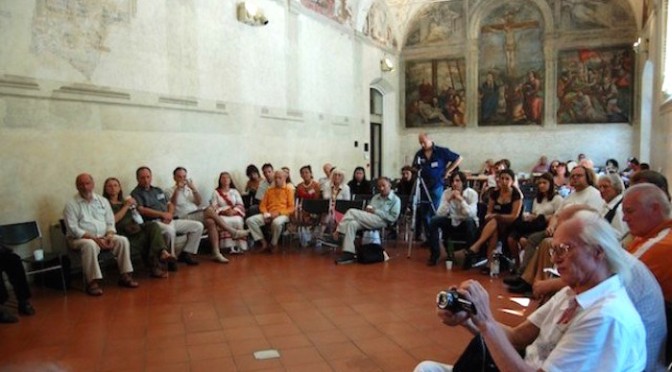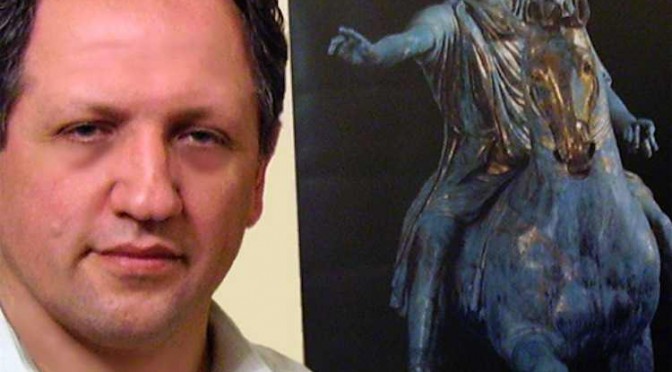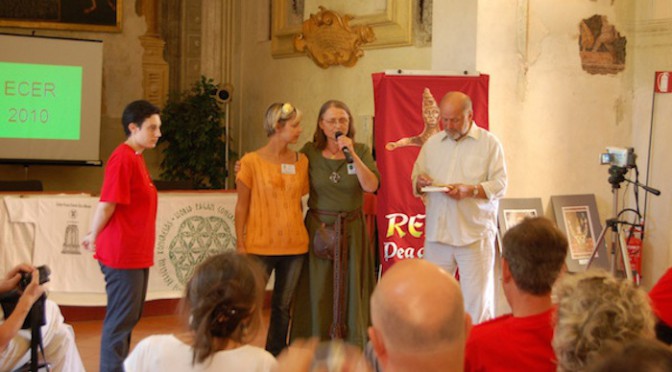From 25 to 29 August, the city of Bologna in Italy hosted the European Congress of Ethnic religions. Referred to as ancient pre-Christian (pagan) or native (indigenous) religions. The first conference was held in Vilnius in 1998, and the for runner of this inter-religious union was named the “World Congress of Ethnic Religions. ” During the past 13-years this religious movement has been growing, and representatives meet regularly in other European countries. This year it was in Bologna with about 100 delegates from Denmark, Norway, Germany, France, Greece, Lithuania, Latvia, Portugal, Czech Republic, Poland, Ukraine and Russia. Continue reading The European Ethnic Religions Conference in 2010 (Oaks 7)
Category Archives: Bologna 13th
Bologna 2010 speech of Vlassis Rassias (Supreme Council of Ethnikoi Hellenes – YSEE)
Dear friends, brothers and sisters, fellow pagans.
I’ m Vlassis Rassias and I represent the Supreme Council of Ethnikoi Hellenes (YSEE), the main board of representation for the followers of the ethnic polytheistic Hellenic Religion. Our aim is to defend from verbal and physical abuse all the holy items, symbols and ideas of our Tradition and, of course, to fully restore the Hellenic Religion, against the fact that the Greek state has so far omitted in its legislation the granting of legal personality to religious communities apart the three byzantine religions -Orthodox Christianity, Turkish Sunni Islam and Judaism- which constitute Public Law Legal Entities. Continue reading Bologna 2010 speech of Vlassis Rassias (Supreme Council of Ethnikoi Hellenes – YSEE)
The speech of President Jonas Trinkunas in Bologna conference 2010
Dear friends,
Greetings to all participants of the WCER conference. I would like to remind you that our organization, born in 1998, this year will be gathering for the 13th time. I am very pleased that we have been so graciously invited to the city of Bologna in Italy. Bologna is a historically important Renaissance city, so Gentilitas is choosing the location where the Congress will take place according to the needs of the foreign Delegations. We are very grateful to the religious association Gentilitas – Spiritualita Italica, who put a lot of effort so that delegates from different countries could gather to socialize and discuss. Continue reading The speech of President Jonas Trinkunas in Bologna conference 2010
Report of Slavonic Native Religion community «The Great Fire, Bologne, Italy 2010
The Slavonic Native Religion community«The Great Fire as one of the examples of revival the traditional culture and it`s main values»
The idea of revival the native Slavonic religion appeared in Ukraine in the beginning of 20-th century. During the long period, when Ukraine was a part of the Soviet Union, the revival of the traditional Slavonic religion was very difficult. But still, there were people, who understood all the importance ofancient religion. Continue reading Report of Slavonic Native Religion community «The Great Fire, Bologne, Italy 2010
Die Ethik des Alt-Heidentums
Wenn man die alte Religion der Vorfahren aus den nicht so reichlichen Quellen rekonstruiert, dann steht man irgendwann vor dem Problem, daß zu einer Religion, die dem einzelnen Menschen auch Anleitungen für ein richtiges, also den Göttern gefälliges Handeln geben soll, eine ausgearbeitete ethische Lehre dazugehört. Leider ist es aber bei den germanischen Überlieferungen so, daß ethische Regeln nur indirekt zu finden sind und es daher viel Mühe braucht, um daraus wieder eine vollständige ethische Lehre zu entwickeln. Continue reading Die Ethik des Alt-Heidentums
Nine Noble Virtues of Ásatrú
As with most other indigenous ethnic or folk religions, the ancestors of modern-day Scandinavians actually had no specific name for their religion. In those ancient times, when the whole community lived by one same religion, there was no need for a “name,” because there were simply no other religions known to them at the time. Continue reading Nine Noble Virtues of Ásatrú
ETHICS OF BALTIC RELIGION
By Jonas Trinkūnas
The Lithuanians’ ancient religion is inseparable from homeland, ancestors’ land, language; it takes its root in high antiquity and our ancestors are its originators. The ancestors pass on their most sacred knowledge to us as a traditional culture with its customs, morality, folk songs, etc. The religion itself formed as an expression of the sacrality of cultural traditions, closely related with the moral outlook. Continue reading ETHICS OF BALTIC RELIGION
THREE BASES FOR A PAGAN TRADITIONAL ETHIC IN THE PRESENT WORLD
At the ECER congress, Bologna 26-29th August 2010 c.e.
Warning: In these pages I make a wide use of the words “Pagan” and “Paganism”, even though I know that these words aren’t adopted or approved by every group here. But since I’m going to talk about some general principles that should be common to several ancient non-monotheistic traditions and since here in Italy we are used to hear many people saying that Italian tradition is only catholic tradition, I’ve decided to use the word “pagan” only to mean a tradition coming from these ancient non-monotheistic religions. Continue reading THREE BASES FOR A PAGAN TRADITIONAL ETHIC IN THE PRESENT WORLD
Ethics, moral and virtue in the context of the germanic pagan folks
By Frank Wilke
The term ethics (old Greek ethos) designates the habit, custom, usages and kind of sense of a folk. Thus the ethics is the science of correct or wrong acting and wanting (of an individual, a folk or a society) and struggles for the attempt of a clarifying of the elementary question, what good and bad is. Additionally that central, most-discussed subsection of philosophy, which concerns practically each humans, includes the terms of the individual human freedom, the social standards, the morality and the moral itself in general. Continue reading Ethics, moral and virtue in the context of the germanic pagan folks
Bologne ECER Declaration-2, 29th of August, 2010
Bologne ECER Declaration-2, 29th of August, 2010
The WCER delegates who gathered in Bologna, Italy (2010.08. 26-29) at our yearly conference came to the decision that from now on our name should be changed to European Congress of Ethnic Religions. The word “World” should be “European” instead. Why did we decide to focus only on Europe? Thirteen years have passed since the creation of the Congress in 1998 in Vilnius, Lithuania. Every year, conferences were organized in various European countries and it turned out that that the Congress actually unites only people of European indigenous traditions, even though the congress is open to all other traditions. Continue reading Bologne ECER Declaration-2, 29th of August, 2010


